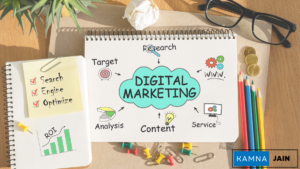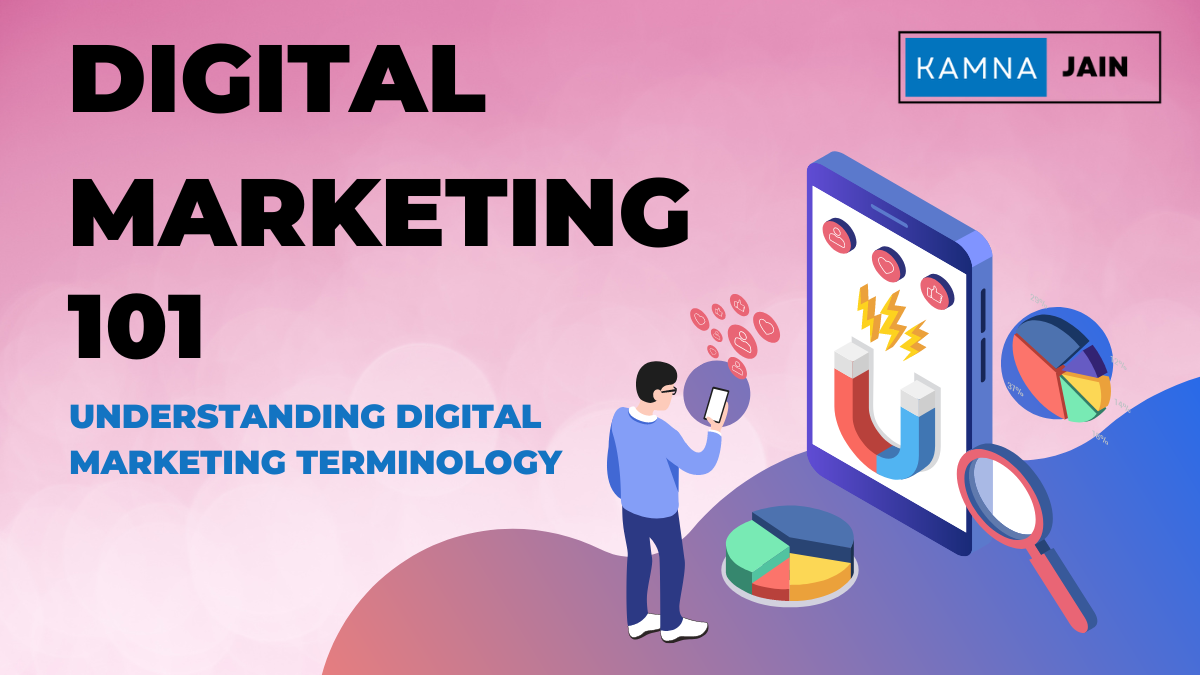Digital Marketing, has become essential to succeed in any career in today’s age.
According to a survey by Gartner, 72% of the marketing budget goes to digital marketing. Marketing is hard; digital marketing is harder. However, you don’t need to have an overrated MBA to succeed in the same, trust me.
At the beginning of the 21st century, only a few were aware of it, and guess what? A decade later, it is the most lucrative field in the communication industry.
As you are reading this blog so intensely, I would like to ask what you understand when you hear Digital Marketing, some images or catchy content? If you ask me, I would say it is the process of people amplifying their voices over space and time. People make digital marketing too complex, but I will simplify it.
According to KB Marketing Agency, “Ignoring online marketing is like opening a business but not telling anyone.”
You are on the wrong route if you think you have business knowledge and can easily thrive in the current world. So, to help you understand the concept of Digital Marketing, I started with the understanding of Digital Marketing instead of directly jumping on the terms. From your local tea shop to the big brands everyone wants them to see in the digital world, aren’t they? Why? Because it is the present and it is the future. However, digital marketing is far beyond a campaign or posting eye-catching visuals.

So, let me start with the most important term and dive as deep as possible.
Algorithm: Scary enough! The most naughty boy in the class. When I say the algorithm, I mean search engine algorithm, Social media and CRM algorithm. It is like some rules, parameters and calculations designed to deliver the expected results. When you search on Google and see the relevant results of your query every time or watch some content on Instagram, you will see the same kind of content the next time.
Analytics: Marketing analytics means collecting, tracking and analyzing the data to use it in future.
Brand Positioning: We know about brands, but what do you mean by brand positioning? Brand positioning involves building the brand’s identity and then connecting it through a particular tone, logo, visual designs and representations of Social Media.
Content Strategy: Planning is easy, implementation is hard, and Content strategy is the heart of marketing. It includes creating and distributing content into campaigns like eBooks, videos, podcasts and social media posts. If you lack here, you are already out
of the game.
Email Marketing: Email was invented by Ray Tomlinson back in 1971. It will never die. According to me, it is the best channel for Digital Marketing. It is not like the message that generally comes into spam or promotion. Email marketing is beyond that.
Social Media Marketing: If it is a matter of building trust and reaching a wider audience, then Social Media Marketing is best in this game. It is part of direct marketing, where leads play a crucial role.
Affiliate Marketing: You read about Mommies of Egypt, didn’t you? Affiliate marketing is the same. This is the oldest form of marketing, and digital marketing gave it a new lifeline. X will sell a brand product and get a commission based on the sale; the more X can sell, the more X will get as a commission.
Search Engine Optimization (SEO): I don’t want to miss the term you will hear a lot if you become a writer. We can count it as an action through which websites get more visibility. If you are searching for something, SEO will help you to bring the website in front of you.
Search Engine Marketing (SEM): This is getting more traffic to your website through SEO or paid ads.
Conversion Rate: Conversion means completion of any desired action. In the marketing term, it is measured by the number of overall people divided by the converted users. Like you are running an ad to sell an eBook, 50,000 people see your ads, but only 32 people click the link to buy the book.
I would like to mention that digital marketing is always data-driven.
Cost per Acquisition (CPA): It is very specific but worth mentioning. It is a pricing model that charges only when leads, sales or conversions are generated. As a marketer, you will be able to understand how much a company can pay to have a lead or drive new customer growth.

Pay Per Click (PPC): It is the part of paid ads; Brands will pay only when someone clicks on the link, but do you know it can be beneficiary as it can give you a a cost-effective solution and when someone searches some related term of your ads then your ad will also come up so you will get more organic traffic.
Customer Relationship Management (CRM): Focus here; it is a set of applications that brands use to track customer data, analyze it and receive relevant real-time data.
Call to Action: The most important partner in your marketing career. Did you ever see that every ad or every copy tells you to take action? Like ‘buy now’, ‘Click now’, ‘Now or never’. Yes, you got the point. It forces you to take action. The better the CTA, the better the chances to increase the conversions.
Do you know how to send personalized Emails?
Engagement Rate: Tell me the truth: How often do you check your phone without cause? Maybe 100 times. Similarly, the brands have metrics to check the target market’s involvement in their content with likes, comments and interactions.
Funnel: Here comes the real and important one. Do you know how we pour paraffin into a kerosene lamp to get heat and light? What do we use? A funnel. You can relate to it; in this case, it is a sales funnel from the pre-mature customer to the buyer’s journey.
We can divide it into three parts,
TOFU Top of the funnel: It is the stage where visitors are not ready to buy, but brands are providing value through quality content and resources.
MOFU Middle of the Funnel: It is the middle of the buyer’s journey where buyers have identified their problems but are not ready to buy yet.
BOFU Bottom of the Funnel: This is the last step when buyers are ready to buy, or salespersons make them ready to buy it.
Key Performance Indicators: It is a metric that helps to track the progress towards the brand’s goal. It can implement the Specific, measurable, Achievable, Relevant and time-bound (SMART) strategy.
Will it be better if I share some resources with you?
Here are some blogs to follow
- Neil Patel
- Moz
- Marketing Land
Here are some recommendations for courses
- Coursera
- Udemy
Here are some Books to follow
- Permission Marketing by Seth Godin
- Youtility by Jay Baer
- Digital Marketing for Dummies by Ryan Deiss

Let’s Conclude
There are so many terms, and this is not the blog to introduce you to all of them, but I have tried to discuss and bring the best terms to know as an aspiring digital marketer. I would like to mention that Digital Marketing is not a single-day task. It requires time and an understanding of the market, and then you can’t work in every marketing field.
It’s not like you will be a marketer once you understand the terms; you must understand the whole game according to your growth. Remember, if you fracture your bones, you go to an orthopaedic, not a generalist. You need to understand the 360 of the market and then choose your niche wisely where you can excel and thrive. I will be back with another important blog. Till then, learn and work on it and let me know in the comments if it was useful for you or not.


Perfectly written Kamna, great tips 🙌